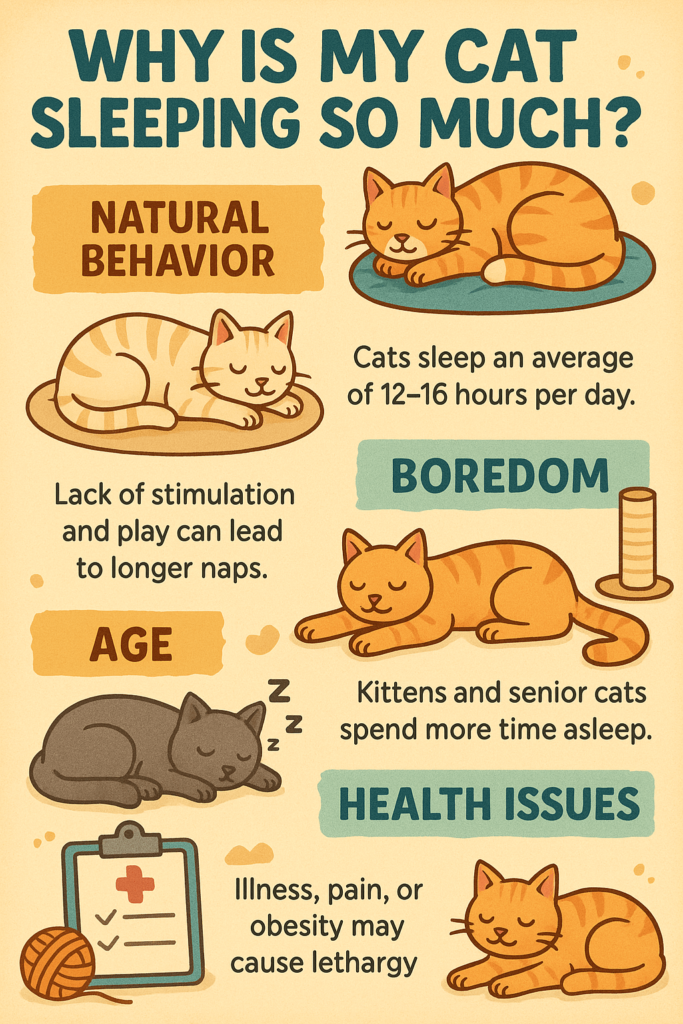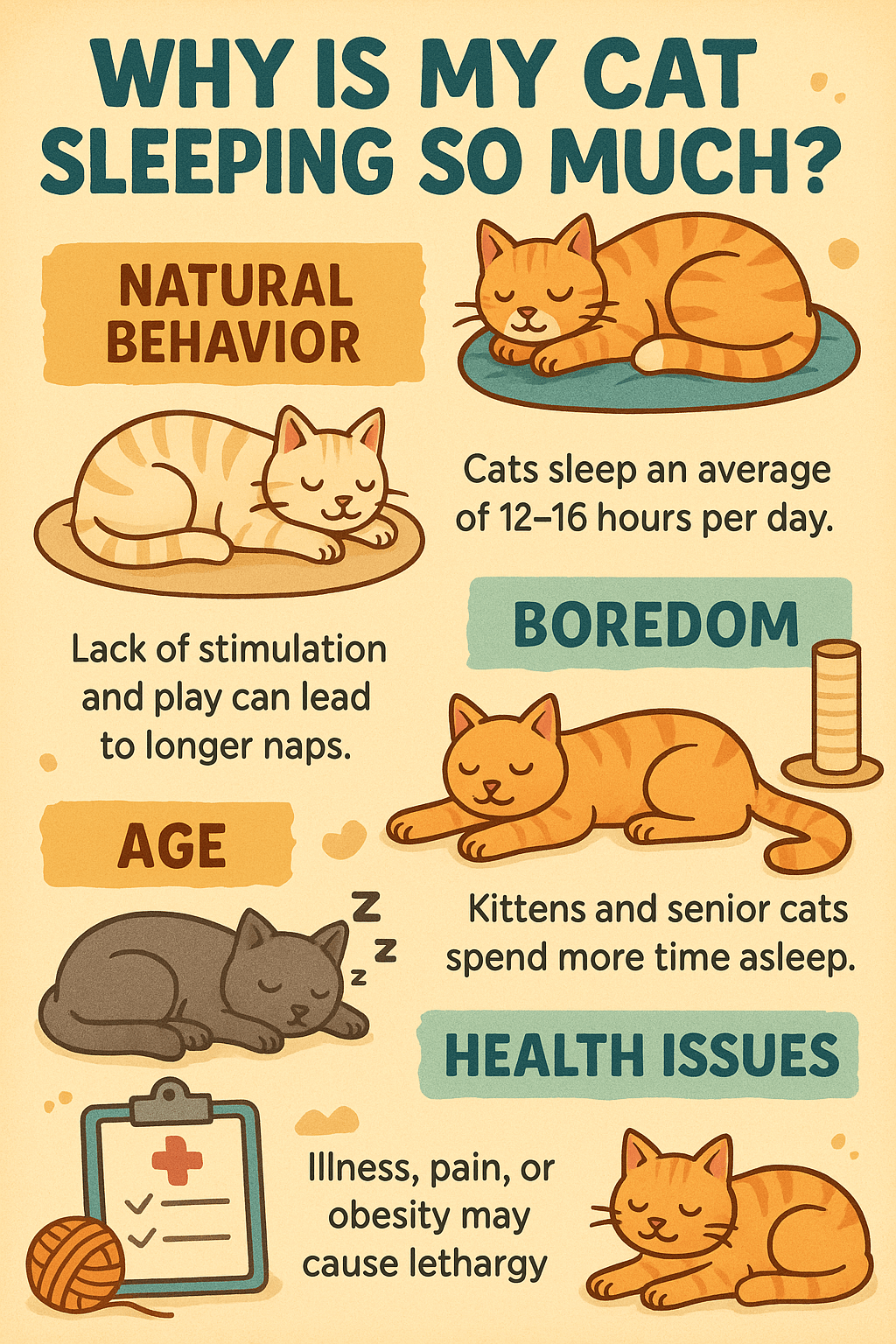Why Is My Cat Sleeping So Much?
Cats are notorious for their love of sleep, but when your feline friend seems to be snoozing more than usual, it’s natural to wonder if something might be amiss. While cats naturally spend a significant portion of their day resting, excessive sleep can sometimes signal underlying issues. Understanding the reasons behind your cat’s sleeping habits is key to ensuring their well-being. In this blog post, we’ll explore the science of feline sleep patterns, factors that influence them, and how to determine whether your cat’s slumber is perfectly normal—or worth investigating further.
Expert Opinion: The Benefits of Homemade Cat Food for Allergies
“Because making your own cat food lets you choose the proteins in your cat’s bowl, homemade cat food is perfect for cats with food allergies. In 2013, DNA testing found that most limited-ingredient or hypoallergenic diets contained proteins that weren’t mentioned on the label. Ironically, the study found that of all the unlabeled ingredients detected in pet foods, chicken was the most common. That’s right—one of the leading cat allergens.”
Understanding Normal Cat Sleep Patterns
Cats are crepuscular animals, meaning they are most active during dawn and dusk. However, they still spend a large portion of their day asleep. Here’s what you need to know about their typical sleep behavior.
Average Sleep Duration:
Adult cats sleep between 12 to 16 hours per day, while kittens and senior cats may sleep even longer.Energy Conservation:
Cats sleep to conserve energy for hunting or play, even if they don’t need to hunt for food in a domestic setting.Nocturnal Activity Spikes:
Despite their long naps, cats often become lively at night, engaging in bursts of activity after periods of rest.Environmental Influence:
Indoor cats may sleep more than outdoor cats due to fewer stimuli and less physical activity in their environment.Seasonal Changes:
Cats may sleep more during colder months as their bodies adapt to reduced daylight and activity levels.
These patterns are generally normal, but any sudden or extreme changes in sleep habits could indicate an issue that needs attention.

Signs Your Cat’s Sleep Habits Might Be Abnormal
While some variation in sleep is normal, certain behaviors can signal that your cat’s excessive sleep is cause for concern. Keep an eye out for these warning signs.
Lethargy During Awake Hours:
If your cat seems unusually sluggish or uninterested in activities they once enjoyed, it could indicate health problems.Loss of Appetite:
A decrease in eating alongside increased sleep can point to underlying medical conditions like infections or gastrointestinal issues.Excessive Hiding:
Cats that sleep excessively and hide more than usual may be feeling stressed, anxious, or unwell.Changes in Personality:
Increased aggression, clinginess, or withdrawal during waking hours can accompany abnormal sleep patterns.Difficulty Waking Up:
If your cat seems groggy or disoriented when awakened, it may suggest deeper issues such as neurological problems.
Recognizing these signs early allows you to address potential health concerns before they escalate.
Check this guide 👉Why Wont My Cat Sleep With Me? Best 7 Expert Tips!
Check this guide 👉Why Does My Cat Sleep with Arms Stretched Out? Best 7 Tips!
Check this guide 👉Cat Sleeping with Head Down: Best 7 Expert Tips!
Reasons for Normal Sleep Patterns | Potential Causes of Excessive Sleep |
|---|---|
Energy conservation for hunting instincts | Illnesses like fever or infections |
Crepuscular nature (active at dawn/dusk) | Pain or discomfort from injuries |
Environmental boredom or lack of stimulation | Nutritional deficiencies |
Seasonal changes affecting activity levels | Stress or anxiety |
Age-related sleep needs (kittens/seniors) | Medications or side effects |
How to Encourage Healthy Sleep Patterns in Your Cat
If your cat’s sleep habits seem off, there are steps you can take to encourage healthier routines and ensure they stay active and engaged.
Provide Mental Stimulation:
Introduce interactive toys, puzzles, or treat-dispensing games to keep your cat mentally sharp and entertained.Establish a Routine:
Set consistent feeding, play, and bedtime schedules to help regulate your cat’s internal clock.Create a Comfortable Sleep Environment:
Ensure your cat has cozy, quiet spots to rest, away from noise or disturbances.Encourage Physical Activity:
Schedule daily play sessions with wand toys or laser pointers to burn off excess energy.Monitor Diet and Hydration:
A balanced diet supports overall health, which directly impacts sleep quality and energy levels.
By fostering a stimulating and structured environment, you can help your cat maintain healthy sleep habits.
When to Consult a Veterinarian About Your Cat’s Sleep
If your cat’s excessive sleep persists despite adjustments to their routine, it’s time to consult a professional. Here’s what to discuss with your vet.
Comprehensive Health Check-Up:
Request a thorough examination to rule out illnesses such as diabetes, hyperthyroidism, or kidney disease.Behavioral Observations:
Share details about your cat’s recent behavior, including appetite, litter box habits, and interactions with family members.Blood Tests and Diagnostics:
Ask about blood work or imaging tests to identify hidden health issues contributing to lethargy.Medication Review:
Discuss whether current medications or supplements could be affecting your cat’s energy levels.Stress Assessment:
Explore possible sources of stress, such as household changes or conflicts with other pets.
A veterinarian can provide valuable insights and treatment options tailored to your cat’s specific needs.
Factors Influencing Your Cat’s Sleep
Several external factors can influence how much your cat sleeps, and understanding these can help you better manage their routine.
Age-Related Changes:
Kittens and senior cats tend to sleep more due to growth spurts or declining energy levels, respectively.Temperature Fluctuations:
Cats may sleep longer on cold days to conserve body heat or nap less during warmer weather.Dietary Choices:
High-quality protein-rich diets provide sustained energy, while poor nutrition can lead to fatigue.Household Dynamics:
The presence of other pets, children, or frequent visitors can alter your cat’s sleep schedule.Routine Adjustments:
Changes in your daily schedule, such as working from home or traveling, can disrupt your cat’s rhythm.
By identifying these influences, you can make informed decisions to support your cat’s natural sleep cycle.
Benefits of Adequate Rest for Cats
Just like humans, cats benefit greatly from sufficient rest, which plays a crucial role in their physical and mental well-being.
Improved Cognitive Function:
Sleep enhances memory retention and learning abilities, especially important for kittens developing new skills.Stronger Immune System:
Restful sleep boosts immune function, helping cats fight off illnesses more effectively.Enhanced Muscle Recovery:
After vigorous play or exercise, sleep allows muscles to repair and grow stronger.Reduced Stress Levels:
Proper rest minimizes cortisol production, keeping your cat calm and content.Better Overall Health:
Consistent sleep patterns contribute to a longer, healthier life for your feline companion.
Ensuring your cat gets enough rest supports their longevity and happiness.
Fun Ways to Keep Your Cat Active
Engaging your cat in fun activities not only reduces excessive sleep but also strengthens your bond with them.
Interactive Toys:
Feather wands, crinkle balls, and motorized mice stimulate your cat’s hunting instincts and keep them entertained.DIY Obstacle Courses:
Use boxes, tunnels, and shelves to create an indoor playground that encourages climbing and exploration.Scheduled Playtime:
Dedicate 10-15 minutes twice daily to focused play sessions, mimicking real-world hunting scenarios.Window Perches:
Install a perch near a window so your cat can observe birds, squirrels, and passing cars for mental stimulation.Clicker Training:
Teach tricks using clicker training to challenge your cat’s mind and reward their efforts with treats.
Incorporating these activities ensures your cat stays happy, healthy, and alert.
Frequently Asked Questions About Cat Sleep
Is it normal for my cat to sleep all day?
Yes, cats naturally sleep 12-16 hours daily, but excessive sleep combined with other symptoms may warrant a vet visit.
Why does my cat sleep more in winter?
Cats sleep longer in colder months due to reduced daylight and lower activity levels.
Can stress affect my cat’s sleep?
Absolutely—stress, anxiety, or environmental changes can lead to increased sleep or restless behavior.
Do older cats sleep more than younger ones?
Yes, senior cats often sleep longer due to decreased energy levels and age-related health issues.
What should I do if my cat won’t wake up easily?
If your cat is difficult to rouse or seems disoriented, contact your vet immediately to rule out serious conditions.
Understanding and Supporting Your Cat’s Sleep Needs
Cats are masters of relaxation, but understanding why they sleep so much—and recognizing when something might be wrong—is essential for responsible pet ownership. By familiarizing yourself with their natural sleep patterns, addressing potential concerns, and providing enrichment, you can ensure your feline friend enjoys restful nights and playful days. Remember, every cat is unique, and paying attention to subtle changes in their behavior will help you provide the best care possible. With patience, observation, and a little extra love, you’ll create a harmonious balance that keeps your cat happy, healthy, and well-rested.
Dog Tapeworm Life Cycle: Best 7 Expert Tips! – Learn how tapeworms infect dogs, spot symptoms, and break the cycle with expert prevention strategies.
Anxious Cat Body Language: Best 7 Expert Tips! – Learn to spot signs of stress, understand triggers, and help your cat feel safe and relaxed.
Anxious Dog Body Language: Best 7 Expert Tips! – Learn to spot signs of anxiety, respond effectively, and help your dog feel safe and secure.
Is Breeding Dogs Bad? Best 7 Expert Tips! – Explore the ethics, benefits, and risks of dog breeding to make informed decisions for a better future.





